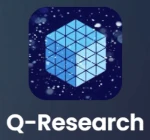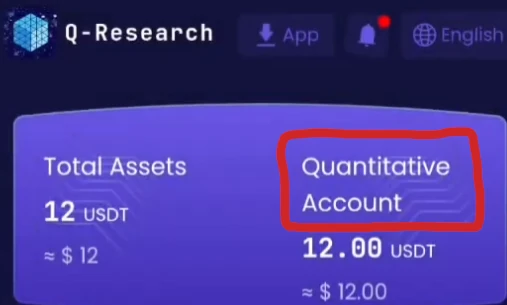Q-Research Review: Quantitative trading “click a button” Ponzi
 Q-Research fails to provide ownership or executive information on its website.
Q-Research fails to provide ownership or executive information on its website.
Q-Research’s website domain (“q-research.vip”), was registered with bogus details on March 27th, 2025.
Of note is Q-Research’s website domain being registered through the Chinese registrar Alibaba (Singapore).
Q-Research has already attracted the attention of financial regulators. The Central Bank of Russia issued a Q-Research pyramid fraud warning on April 8th, 2025.
As always, if an MLM company is not openly upfront about who is running or owns it, think long and hard about joining and/or handing over any money.
Q-Research’s Products
Q-Research has no retailable products or services.
Affiliates are only able to market Q-Research affiliate membership itself.
Q-Research’s Compensation Plan
Q-Research affiliates invest tether (USDT). This is done on the promise of advertised returns:
- VIP1 – invest 12 to 51 USDT and receive 33.34% a day
- VIP2 – invest 52 to 151 USDT and receive 33.46% a day
- VIP3 – invest 152 to 321 USDT and receive 33.75% a day
- VIP4 – invest 322 to 721 USDT and receive 34.01% a day
- VIP5 – invest 722 to 1521 USDT and receive 34.35% a day
- VIP6 – invest 1522 to 3321 USDT and receive 34.49% a day
- VIP7 – invest 3322 to 6621 USDT and receive 34.77% a day
- VIP8 – invest 6621 to 12,221 USDT and receive 35.06% a day
- VIP9 – invest 12,222 to 33,332 USDT and receive 36% a day
Q-Research pays referral commissions on invested USDT down three levels of recruitment (unilevel):

- level 1 (personally recruited affiliates) – 12%
- level 2 – 2%
- level 3 – 1%
Joining Q-Research
Q-Research affiliate membership is free.
Full participation in the attached income opportunity requires a minimum 12 USDT investment.
Q-Research Conclusion
Q-Research is yet another “click a button” app Ponzi scheme.
Q-Research’s “click a button” Ponzi ruse is quantitative trading:

The presented ruse is Q-Research affiliates log in and click a button (the more invested the more the button needs to be clicked).
Clicking the button purportedly generates revenue via quantitative trading, which for some reason Q-Research shares a percentage of with affiliate investors.
If that makes no sense it’s because it doesn’t. Randoms clicking a button in an app doesn’t trigger quantitative trading.
In reality clicking a button inside Q-Research’s app does nothing. All Q-Research does is recycle newly invested funds to pay earlier investors.
Q-Research is part of a group of “click a button” app Ponzis that have emerged since late 2021.
Examples of already collapsed “click a button” app Ponzis using the same quantitative trading ruse are DSOA, AK USD and AI Cambridge.
Since 2021 BehindMLM has documented hundreds of “click a button” app Ponzis. Most of them last a few weeks to a few months before collapsing.
“Click a button” app Ponzis disappear by disabling both their websites and app. This tends to happen without notice, leaving the majority of investors with a loss (inevitable Ponzi math).
In the lead up to a collapse, “click a button” Ponzi investors also tend to find their accounts locked. This typically coincides with a withdrawal request.
As part of a collapse, “click a button” Ponzi scammers often initiate recovery scams. This sees the scammers demand investors pay a fee to access funds and/or re enable withdrawals.
If any payments are made withdrawals remain disabled or the scammers cease communication.
Organized crime interests from China operate scam factories behind “click a button” Ponzis from south-east Asian countries.
In September 2024, the US Department of Treasury sanctioned Cambodian politician Ly Yong Phat over ties to Chinese human trafficking scam factories.
Through various companies he owns, Phat is alleged to shelter Chinese scammers operating out of Cambodia.
Myanmar claims to have deported over 50,000 Chinese scam factory scammers since October 2023. With “click a button” app scams continuing to feature on BehindMLM though, it is clearly not enough.
In late January 2025, Chinese ministry representatives visited Thailand. The stated aim of the visit was to tackle organized Chinese crime gangs operating from Myanmar.
In early February 2025, Thailand announced it had cut power, internet access and petrol supplies to Chinese scam factories operating across its border with Myanmar.
As of February 20th, Thai and Chinese authorities claim ten thousand trafficked hostages had been freed from Myanmar compounds.
Also on February 20th, five Chinese crime bosses were nabbed in a wider raid of four hundred and fifty arrests in the Philippines.
On March 19th it was reported that, despite the recent raids and arrests, “up to 100,000 people” are still working in Chinese Myanmar scam factories.
Regardless of which country they operate from, ultimately the same group of Chinese scammers are believed to be behind the “click a button” app Ponzi plague.
Update 20th April 2025 – Q-Research has collapsed. As at the time of this update Q-Research’s website has been disabled.

